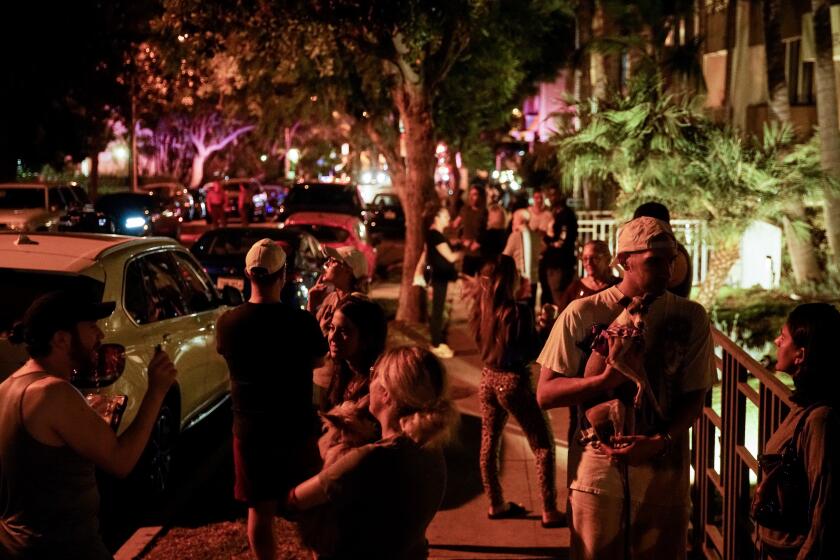Democratic donor Ed Buck paid at least 10 men to use drugs for his own pleasure, prosecutors say

In political circles, Ed Buck was best known as a wealthy donor who championed animal rights and LGBTQ causes, dumping more than half a million dollars into the coffers of Democratic candidates running for school boards, Senate seats and spots on the West Hollywood City Council.
In West Hollywood’s Plummer Park, less than a mile from Buck’s home, homeless men in desperate circumstances had a much simpler frame of reference for the 65-year-old.
They called him “Dr. Kevorkian.”
A 22-page federal criminal complaint unsealed Thursday painted a depraved picture of how Buck earned his grim sobriquet. Ten men told investigators that Buck had paid them to use drugs and dress up in skimpy underwear for his own sexual pleasure. Several of the men claimed they lost consciousness after Buck served them a drink, and some said they woke up to the sight of him injecting drugs into their arms against their will, according to the complaint.

Buck was charged Thursday with one count of distributing methamphetamine leading to a death, according to the U.S. attorney’s office in Los Angeles. The announcement ended a two-year saga that had circled around Buck, local law enforcement leaders and activists from the city’s African American and LGBTQ communities, many of whom alleged Buck had been ducking justice since the 2017 overdose death of Gemmel Moore.
Los Angeles County prosecutors charged Buck earlier this week with operating a drug house, but the federal charge could prove far more perilous. If convicted of providing the drugs that led to Moore’s death, Buck faces a minimum of 20 years in prison.
Buck made a brief appearance in federal court Thursday afternoon and was ordered held without bond. Calls to his attorney seeking comment were not returned.
“Investigators have identified 10 additional victims — nine of whom [Buck] administered drugs or strongly encouraged them to ingest narcotics as part of agreements to be compensated for sexual services,” U.S. Atty. Nick Hanna told reporters Thursday.
Buck was arrested at his West Hollywood home Tuesday night, less than a week after a man fled his home fearing he was suffering a methamphetamine overdose, prosecutors allege. Buck tried to prevent him from getting medical attention, authorities said. The man was able to get to a gas station and call 911 after the Sept. 11 incident, which investigators have said was key to bringing charges against Buck.
“The surviving victim’s statements gave us the break we needed,” said Los Angeles County Dist. Atty. Jackie Lacey, whose office has been the subject of withering criticism for choosing not to prosecute Buck in the past.
Buck’s behavior first came under scrutiny in July 2017 after Moore, who had been homeless and sometimes worked as an escort, died of a methamphetamine overdose. Investigators initially ruled his death to be accidental, but activists and Moore’s family quickly challenged that determination. In a journal found among Moore’s possessions, the 26-year-old Texas man blamed Buck for his drug addiction.
“I’ve become addicted to drugs and the worst one at that,” the journal said. “Ed Buck is the one to thank, he gave me my first injection of chrystal meth.”
The Los Angeles County Sheriff’s Department revisited the case, and in 2018, investigators asked prosecutors to consider four charges in Moore’s death: murder, voluntary manslaughter, and furnishing and possessing drugs. Lacey declined to file a case, citing insufficient evidence.
When a second man — Timothy Dean, 55 — died of an overdose in Buck’s apartment in January, the Sheriff’s Department said it would take another look at the first case.
Buck first gained political notoriety as a self-described conservative Republican while leading a gubernatorial recall effort in Arizona in the 1980s. But he became prominent in California as an “in-your-face” Democratic activist and booster of animal rights and LGBTQ causes. In the last decade, he has donated money to all but one member of the current West Hollywood City Council, as well as candidates for the Los Angeles school board and California Senate.
In that same time frame, prosecutors say, Buck was luring young, disadvantaged men to his home with the promise of drugs and money.
Two fatal overdoses in Democratic donor Ed Buck’s home gave rise to a movement that sought to hold him accountable and uphold the value of gay black lives.
One man, who was homeless and sleeping in West Hollywood’s Plummer Park in 2011, told investigators that he had never used methamphetamine before he heard that Buck was “well-known for compensating male prostitutes with drugs and money,” according to the complaint. The victim agreed to take a “small amount” of drugs at Buck’s behest but said Buck then emptied an entire syringe into his arm.
Several other men said Buck wanted to watch them use drugs while they wore tight underwear, according to the complaint, adding that he became insistent and sometimes forceful if they refused to ingest more narcotics at his command. Two men alleged that Buck had injected them with drugs while they slept on his couch, and others suggested he was surreptitiously giving them unknown substances that made them sleepy or weak.
One man told investigators that Buck hired him as an escort in late 2018. After drinking a “clear soda” provided by Buck, the man said, he felt “sleepy and began to lose control of his physical movements,” according to the complaint.
“When he awoke, Buck was approaching him with two additional syringes loaded with methamphetamine,” the complaint said.
In March 2019 — just two months after Dean was found dead in Buck’s home — another man said Buck also offered him cash and marijuana in exchange for sex. After taking a drink that Buck described as vodka, the man said, he lost consciousness. When he awoke, Buck was injecting him with a syringe and had placed metal clamps on his body, according to the complaint.
One man, who told investigators Buck had contacted him on the website Adam4Adam, said he injected himself with what Buck told him was methamphetamine during a December 2018 encounter at Buck’s West Hollywood apartment. The drug rendered him immobile, the man told investigators, and he laid on the floor of Buck’s apartment for 6 to 7 hours. Buck grew frustrated and at one point wanted him to leave, the man said, but he couldn’t move.
Then Buck brought out the saw, he said.
Buck “obtained a power saw from a closet, turned it on and approached” the man, the complaint says.
A surge of adrenaline snapped him out of paralysis, he told investigators four months later. Buck refused to pay him but eventually sent him money through Zelle, a banking application, according to the complaint.
The man involved in the most recent case said he had lived with Buck since late July and claimed they used drugs and had sex nearly every day for more than a month, according to the complaint.
The decision not to bring charges against Buck last year served as a flashpoint in the city’s black and LGBTQ communities, with many contending he had been spared prosecution because of his ties to Democratic politicians. Others have argued that the case would have been handled differently if the men who died at Buck’s residence were white.
Lacey and other law enforcement leaders pushed back against that narrative during a news conference Thursday. Lacey said there was a misconception among the public that multiple victims had come forward to make allegations against Buck.
“We have done everything possible to put this depraved sexual predator away,” she said.
According to the court documents made public Thursday, five of the victims who spoke to investigators came forward in March and April of this year. But two other men — both of whom made allegations that Buck injected drugs into their bodies while they were asleep — were interviewed in August and September of 2017, after Moore died but before Lacey’s office declined to press charges.
Federal and local prosecutors debated which agency should bring charges against Buck this week, according to two law enforcement sources with knowledge of the case who spoke to The Times on condition of anonymity. One source described the situation as a “fight.”
Lacey said federal prosecutors first became involved in the investigation in June, adding that it made no difference to her who ultimately oversaw the case against Buck.
Jasmyne Cannick, an activist who served as a spokeswoman for Moore’s family and had become the public face of the push to have Buck prosecuted, said that public pressure was the main reason Buck was sitting in a jail cell Thursday.
“I am happy to give them credit, but not at the exclusion of the community,” Cannick said of the district attorney’s office and Sheriff’s Department. “There is a lot of saving face going on by the D.A.”
Times staff writer Alene Tchekmedyian contributed to this report.
More to Read
Sign up for Essential California
The most important California stories and recommendations in your inbox every morning.
You may occasionally receive promotional content from the Los Angeles Times.













